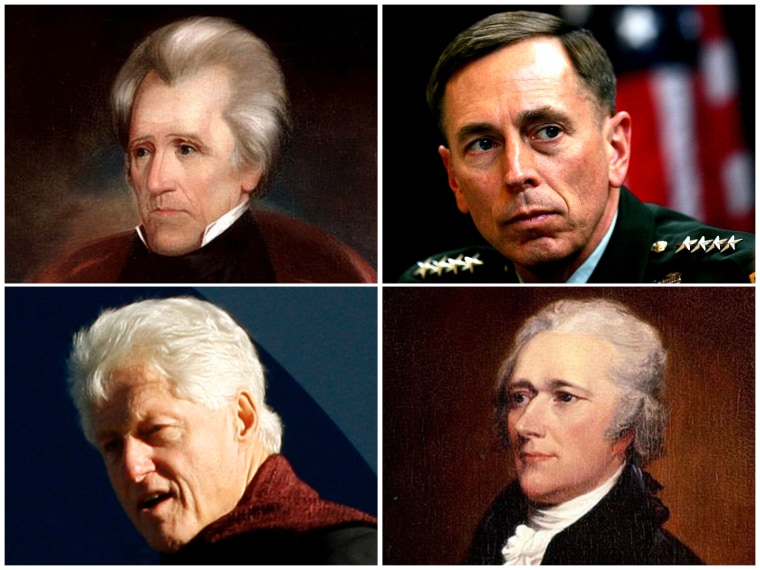As details about the ongoing affair between former-CIA director David Petraeus and his biographer Paula Broadwell continue to emerge, the American public has become obsessed with this story of sex, betrayal and intrigue. Even as the scandal spreads to the upper echelons of our military, the "Spyfall" scandal is hardly the most shocking in our short 250 year history. While many details are still unknown, the tabloid drama playing out right now is something this country has seen several times since its founding. Below are three examples of powerful men caught up in stories of personal indiscretion. Although the era and circumstances may differ, the public's fascination remains the same.
THE REYNOLDS AFFAIR (1791)
Alexander Hamilton was a self-made man who rose from poverty on St. Croix to serve as Treasury Secretary under George Washington. Unfortunately, the first Secretary of the Treasury was also involved in the first sex scandal in American history.
Known as "The Reynolds Affair", Hamilton's career-ending decision to enter into a relationship with Maria Reynolds (pronounced Mariah) ended the way most tales of infidelity do—badly. Both Hamilton and Reynolds (like Petraeus and Broadwell) were married when they began their three-year-long affair. What makes the indiscretion more bizarre is that Maria's husband, James, knew about the relationship and used it blackmail Hamilton out of more than $1,000.
Hamilton was forced to reveal the truth to congressional investigators when James Reynolds got involved in a speculation scheme and used his knowledge of the affair to buy his way out of trouble. Because Hamilton had evidence which cleared his name in the speculation scheme, his involvement with Maria Reynolds remained quiet.
That is until Thomas Jefferson got a hold of the their love letters and used them to destroy Hamilton in the most public way possible. Five years after the affair ended, the letters were published in a newspaper. Instead of denying the affair or keeping quiet, Hamilton published his own account of the relationship in explicit detail while his wife, Eliza, was pregnant. His public admission both cleared his name of corruption charges and destroyed his career.
Hamilton biographer Ron Chernow wrote:
"The Reynolds affair was a sad and inexcusable lapse on Hamilton's part, made only the more reprehensible by his high office, his self-proclaimed morality, his frequently missed chances to end the liaison, and the love and loyalty of his pregnant wife."
THE PETTICOAT AFFAIR (1830)
If there is one administration that was made for the tabloid fodder it was that of Andrew Jackson. In his book American Lion, Jon Meacham describes an inaugural ball that got completely out of control.
If the gossip surrounding that incident were an annoyance for the new President, the sex life of his Secretary of War would become a non-stop migraine.
The Petticoat affair, aka the Eaton affair, involved a married Washington D.C. socialite named Peggy O'Neale and Jackson's Secretary of War, John Henry Eaton. O'Neale and her husband, John Timberlake, were mired in debt for most of their marriage—forcing them to go to Eaton (then a Senator and widower) for help. After Timberlake died under what some thought to be suspicious circumstances, O'Neale and Eaton were quickly married. Washington social circles were shocked at the O'Neale's impropriety in not mourning her late husband and marrying so quickly after his death.
The marriage sparked an "anti-Peggy" movement spearheaded by Vice President John Calhoun's wife. Members of Jackson's cabinet took sides, resulting in almost every single cabinet member's resignation. While there doesn't appear to be any evidence of impropriety by today's standards, the 'scandal' did cause a distraction for Jackson and the loss of his top advisers just months before he was up for re-election.
THE LEWINSKY SCANDAL (1998)
No other modern day political scandal is more notorious than that of President Bill Clinton and White House intern Monica Lewinsky. The affair was revealed after Lewinsky's colleague Linda Tripp recorded private phone conversations between herself and the former White House intern.
According to Lewinsky, she and the President Clinton engaged in the affair between 1995 and 1997. At the time, Clinton was under investigation by Kenneth Starr for the Whitewater scandal and other controversies. When Tripp presented her recordings to Starr, he used them during his prosecution.
The allegations of the affair, and the President's initial denial, led to Clinton's impeachment and of the most famous lines of the last twenty years, "I did not have sexual relations with that woman." After his testimony, President Clinton went on national television and admitted to a relationship with Lewinsky that was "not appropriate."
The story was on the front page of every newspaper, the subject of every late night talk show and was arguably the defining moment of Clinton's second-term. The scandal was the first to play ou in the internet age and the public watched it on every channel and read about it in every newspaper.
Running through all of these scandals was a question of common sense, how could people so disciplined in other aspects of their lives show such poor judgement? Can the personal integrity of an individual be separated from their professional integrity? These scandals span three centuries, and we're still trying answer the same questions.
